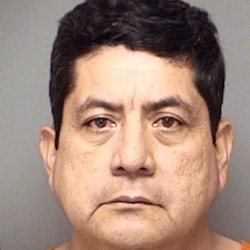 Silvano Uriostegui On the night of May 7, 2009, 40-year-old Maria Uriostegui and her date, Pedro Jose Melgar, were attacked by a knife-wielding assailant when they walked into the bedroom of her second floor apartment.
When police arrived, a window to the apartment was broken, Melgar was gone and Maria was on the ground with nine stab wounds (two of which burst her breast implants) and a broken back. Melgar was located at his apartment with knife wounds on his hands. He said he did not know the man who cut him and that he jumped out of the window to escape.
Maria told police that she had separated from her husband, 47-year-old Silvano Uriostegui and she was living in the apartment with the two youngest of the couple’s four children. She said that she had met Melgar a week earlier on a Spanish-speaking chat line and invited him to the apartment.
She said that she went into her bedroom to plug in her cell phone and Melgar followed. About that time, she was attacked and although the only light in the bedroom was from a television that was on, she believed the man was Silvano.
Police promptly arrested Uriostegui and in June 2009 he was indicted on two charges of aggravated assault with a deadly weapon.
On February 13, 2012, Uriostegui pled guilty to assaulting his wife and the prosecution agreed to dismiss the charge of assaulting Melgar. Uriostegui chose to be sentenced by a jury. After a jury was selected the following day, Maria was called to testify about the attack.
During cross-examination, she admitted she never saw her attacker’s face and only believed it was him based on his smell and the sole of one of his boots.
Uriostegui’s defense attorney requested that Uriostegui’s plea be vacated and the case dismissed because Maria’s testimony was different from her sworn testimony at a civil hearing on a motion for an order of protection when she positively identified Silvano as her attacker.
The defense attorney argued that the prosecutors had assured him that Maria’s identification was positive and reliable and that he would not have allowed Silvano to plead guilty if the prosecution had disclosed the dubious nature of the identification.
The prosecutors, Forrest Beadle and William Schultz, admitted that they knew that Maria’s identification was based on smell and the sole of the attacker’s boot. Schultz told the judge that when he learned that Maria had not seen her attacker’s face, he checked out a man who had previously assaulted her, Alvero Malagon. Records showed, however, that Malagon was in prison at the time of the attack and could not have been responsible.
Denton County District Court Judge Steve Burgess initially declared a mistrial. Uriostegui’s attorney filed a state petition for a writ of habeas corpus seeking to vacate the guilty plea. Following a hearing on the petition, during which the prosecutors testified that they didn’t believe the information was required to be disclosed, Judge Burgess granted the motion to vacate Uriostegui’s guilty plea and dismissed the charge.
The judge ruled that the prosecution should have disclosed that Maria’s identification was based on smell and the sole of the attacker’s boot and that the failure to disclose it was a violation of the 1963 U.S. Supreme Court decision Brady v. Maryland, which requires prosecutors to disclose exculpatory evidence to the defense prior to trial. Judge Burgess said, “My jaw dropped to the ground when Mrs. Uriostegui testified the way that she did. I was shocked. And for the state to actually know this and not disclose it.”
The judge also said, “I can’t fathom how somebody who’s been to law school, let alone practiced law for this period of time, doesn’t understand Brady, doesn’t understand the law. And based upon their answers, the way they were answered – the questions were answered, the original conduct in trial, I can only find that they intentionally goaded the defense into having to make a motion for mistrial, that they purposefully withheld Brady material. And how disingenuous it is to get up here and testify that you don’t know that that it’s Brady that the victim can’t identify by face or by anything other than smell and a boot who the attacker is.”
Burgess then barred Beadle and Schultz from practicing in his courtroom. “A woman that was knifed nine times in the gut and elsewhere doesn’t get justice because nobody can read Brady, understand Brady, or has the innate intellect of a fifth grader.”
Denton District Attorney Bill Johnson reported the matter to the Texas State Bar, but asserted that the prosecutors had not intentionally withheld evidence. Uriostegui’s defense attorney filed a grievance against Schultz, who was the lead prosecutor in the case.
In October 2014, the Texas State Bar suspended Schultz’s law license for six months, but then suspended the sentence and put him on probation for six months. In December 2015, the Board of Disciplinary Appeals upheld the decision. As of March 2016, Schultz’s co-prosecutor, Forrest Beadle, had no public record of discipline by the state bar.
– Maurice Possley
|